Kenya
Karogoto

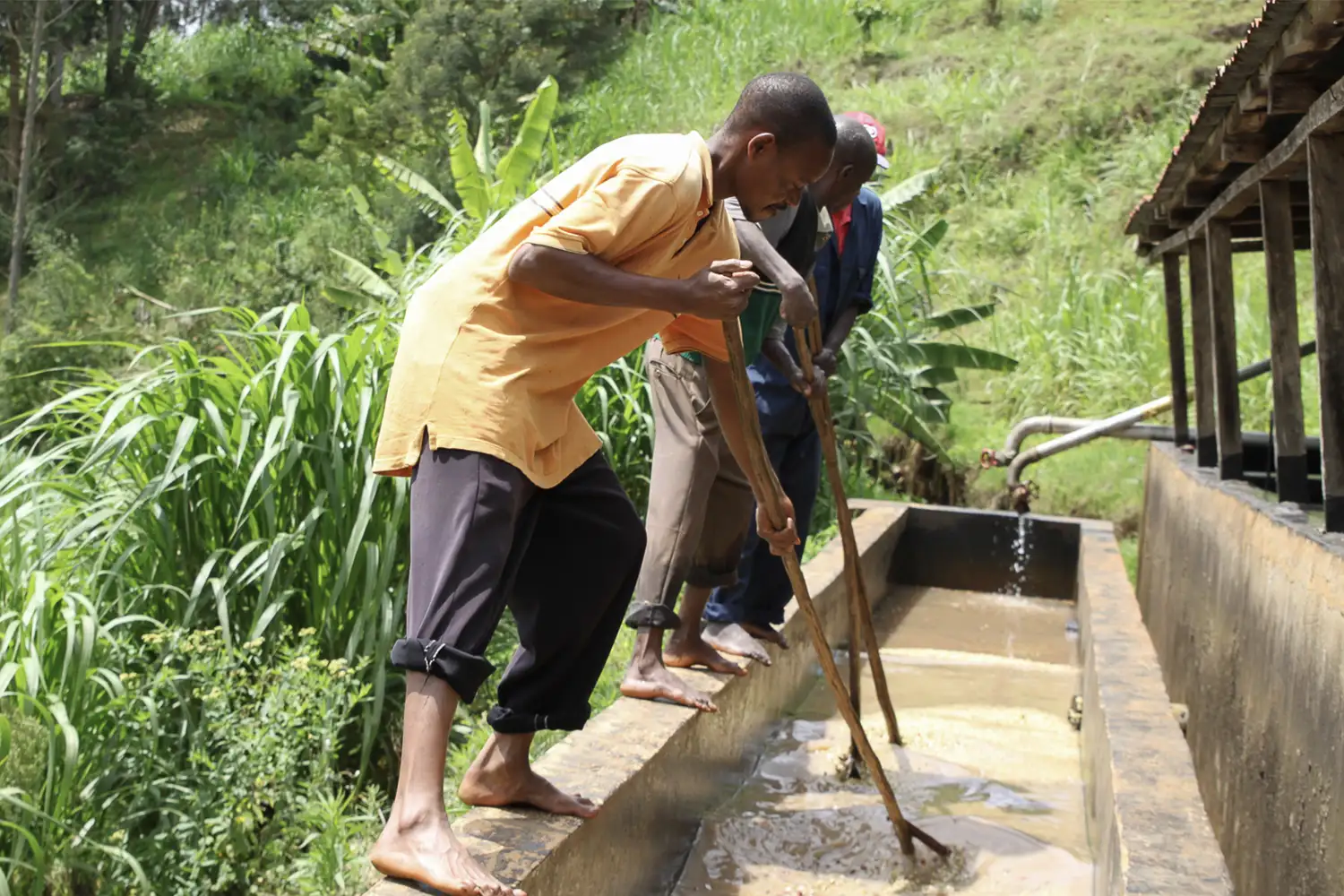
The Karogoto wet mill
Karogoto is a wet mill (also called factory) situated near Karatina town in Nyeri, Kenya. It is one of four wet mills that are owned by the Tekangu farmers cooperative society with over 1,700 members. There are numerous wet mills in Nyeri, often just a few minutes drive from one to another. The reason for this is that Nyeri is home to thousands of smallholder farmers that own on average 0,5 hectares of land where they typically grow coffee, maize, pasture and other crops.
A farmer typically will pick her/ his coffee cherries and sell them to the nearest wet mill that is within walking distance. The cherries get bulked together before they are processed and dried by the staff on a cooperative wet mill and later sold to exporters at the weekly Kenyan coffee auction or directly to roasters.
Farm location: Nyeri, Kenya
How I started buying from Karogoto
Kenya is both a complicated and a very streamlined place to buy coffee. Unlike the origins we buy from in the Americas, it is slightly more challenging to find farmers that own enough land to be able to supply even small roasters like us.
Most smallholder farmers sell their coffee to cooperatives and do not process or dry their own coffees (although they do exist.) On my first coffee buying trip to Kenya back in 2009 I was therefore taken on a tour to visit some of the best cooperative wet mills in Nyeri.
Because our host was Coffee Management Services (CMS), one of the many marketing companies that is hired by the cooperative wet mills to market and sell their coffees, we were taken to their “best in class” cooperatives. Among them were Tekangu and the three wet mills they were operating at that time, Tegu, Karogoto and Ngunguru.
To be honest most of the wet mills looked very similar in structure and none of them really stood out to me. It was not until I was tasting coffees blind several times during that trip when I realised I actually really liked the cup profiles from these three factories and especially the coffee from Karogoto.
In the following years I would still pick out the coffees from these wet mills as some of my favourites while I was on my annual coffee buying trip to Kenya. I decided that even though it is challenging to build a close relationship with the management at a wet mill as they tend to change with cooperative elections from time to time, I wanted to stay loyal to at least one wet mill and see if I could contribute with some positive impact. Although I have been buying coffees from other wet mills in Kenya over the years, Karogoto is the one that I have been sticking to. I simply love the consistent great coffees they produce and have managed to visit them many times over the years.


The farm and the coop
All the coffees that are processed and dried at the Karogoto wet mill are produced by smallholder farmers that are members of the Tekangu Farmers Cooperative Society. Each farmer owns a small piece of land which contains their house and typically some livestock, coffee trees, and other food crops for selling or consuming. The farmer is free to sell his / her coffee cherries to whichever cooperative they chose, but in general will go to the nearest wet mill as they often lack motorised transportation. It often becomes a question of which wet mill paid the most in your local area. All cooperatives are obliged to pay a minimum of 80% of the total selling price of the coffee to the farmers, the remaining 20% is to cover the management costs of the cooperative societies. However a cooperative may pay more than the 80% and the quality produced can vary greatly if the wet mill is not managed properly.
Therefore the price to the farmer can differ a lot from wet mill to wet mill. The cooperatives and farmers are more likely to get a better price if they produce high quality coffee as the buyers looking for the best coffees are normally willing to pay more for the coffee. A lot of the cooperatives and buyers like ourselves also prefer to buy the coffee directly and bypass the Kenyan coffee auction. That way we can negotiate prices directly which normally means the cooperative will fetch a better price and they do not have to pay the fees to the auction. While quality is a factor influencing the selling price of the coffee, it is probably more important for a farmer’s income to increase the quantities they produce.
Improving farm practices
Because quality and quantity is so important for both the farmers and the cooperatives ability to sustain themselves economically, the management at Tekangu and Karogoto are actively educating their members in order to improve agricultural practices at farm level. In recent years they hired their own agronomist to assist and train their members.
This is a service that sometimes is also offered by the marketing agents, but the demand surpasses the capacity, so having their own agronomist ensures their members receive more hands-on training. Unfortunately the vast majority of Kenyan coffee farmers are still depending on mineral fertilisers in order to be able to make their coffee trees produce well.
There is a substantial use of agrochemicals to prevent aggressive and common pests and diseases such as coffee berry disease and leaf rust. The cooperative will typically pre-finance farm inputs in order to ensure that their members are able to produce well, but the key is to teach the farmers how, what and when to apply the different inputs. Other farming practices such as pruning, plant management and cover cropping are also taught. When done well, a farmer like Elmud, who is one of the members of Tekangu, can produce over 40 kilos of coffee cherries per tree. Knowing that the average production yield per tree in Kenya is between 2-3 kilos, it is an astounding difference both in yield but also potential income for a farmer and a cooperative.
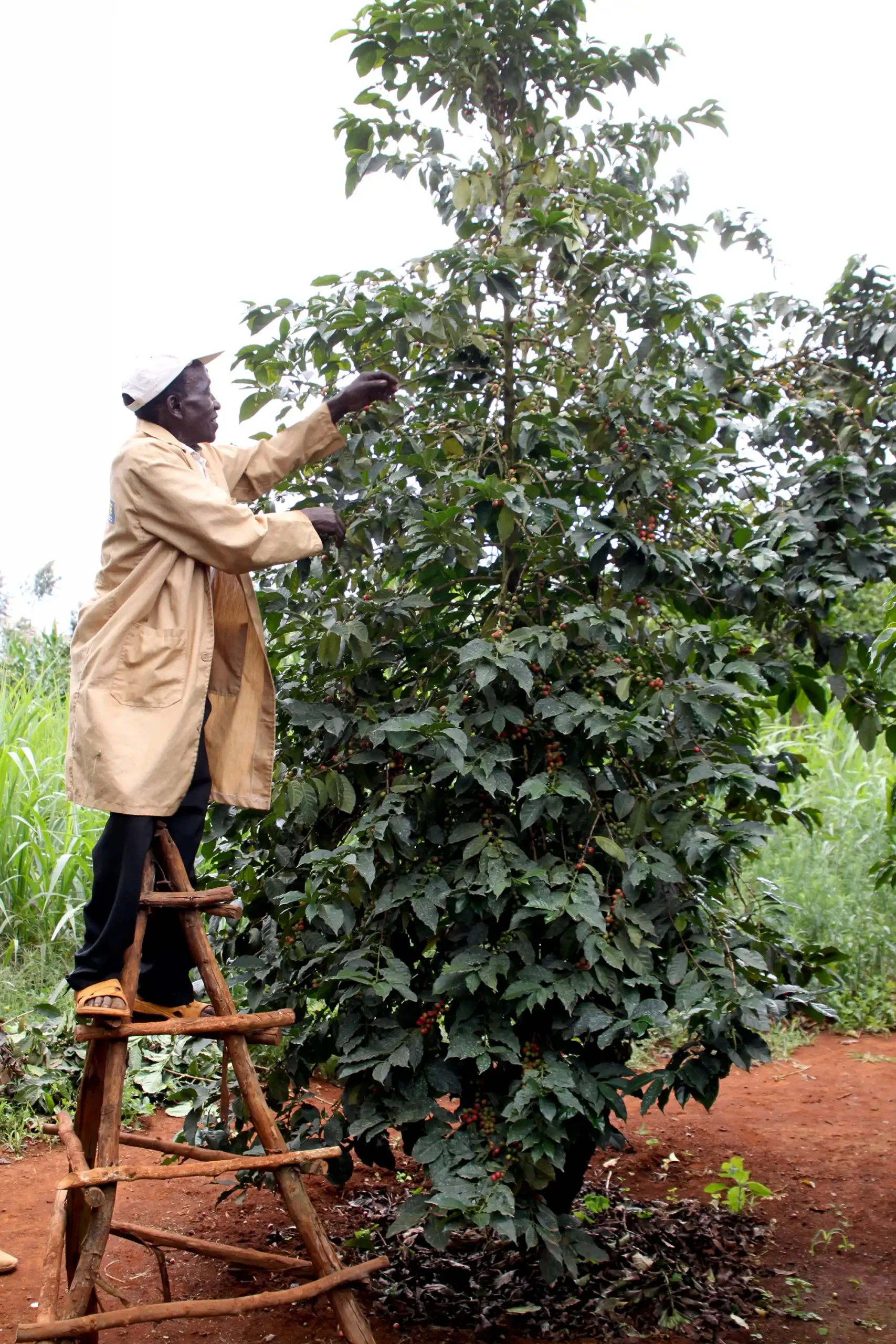
A Trip To Kenya with Tim Wendelboe
Please note, you need to accept functional cookies to be able to play the video.
Planting trees
The cooperative is also providing the farmers with seedlings of coffee trees. Traditionally they have been offered the SL28 and SL34 seedlings, but in recent years the new hybrid Batian has been offered to the farmers as this is resistant to coffee berry disease and tolerant to leaf rust. Whether this will impact the quality of the coffee in the future is still to be determined, but it will hopefully reduce the need for agrochemicals in order to keep the trees productive.
The members are also given seedlings of 5 different native trees to plant on their farms. I believe planting trees and producing coffee under shade is not only better for the land and the soil but also for the quality of the coffee. It will for sure help the farms become more resilient against climate change.
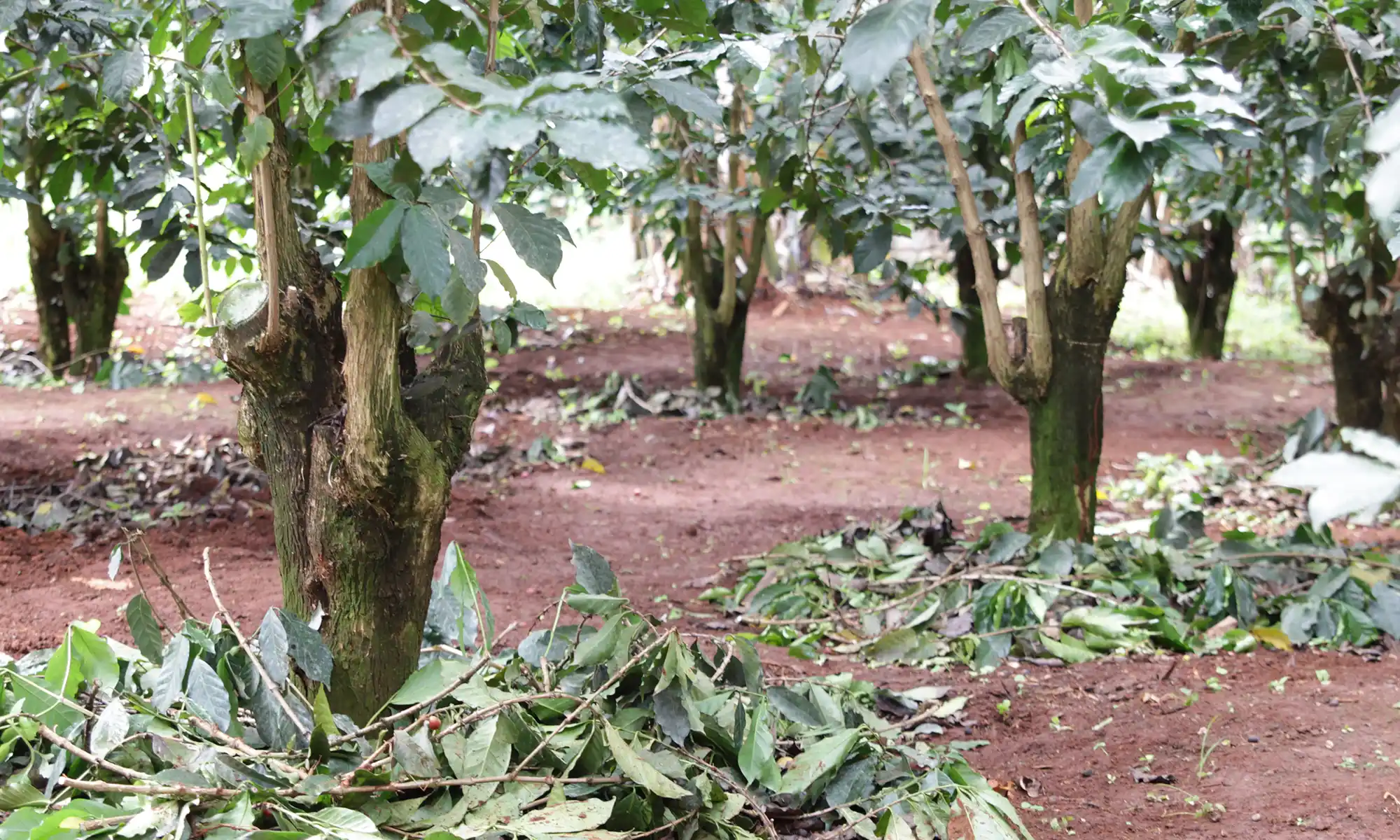
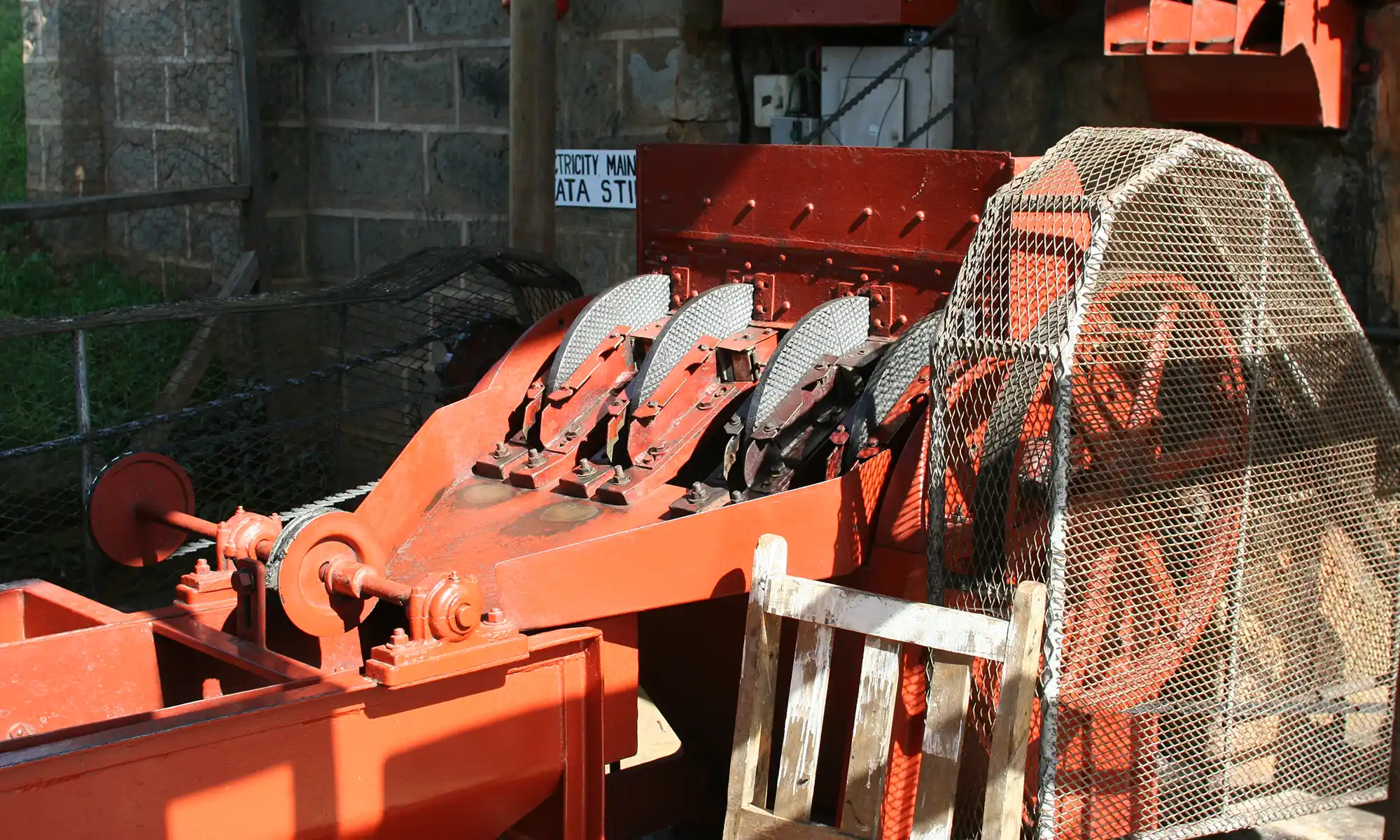
Processing
A lot can go wrong when coffee cherries are processed into parchment coffee. It is therefore key that it is done by skilled people in order to ensure a consistent high quality product. Ephraim Muthee has been the wet mill manager at Karogoto for many years and is not only a good manager and friend but also a coffee producer and member of the cooperative society. Every year he makes sure that the coffee is properly fermented, washed, graded, dried and stored. He oversees that the farmers sort their coffee cherries upon delivery so that the ripe cherries are processed separately from under ripe and over ripe cherries.
The cherries are de-pulped with an old Agard disc pulper which also serves as a grading machine that separates lighter beans from more dense beans and sends them to separate fermentation tanks. (It is the dense coffee that we are most interested in, but the coffee is still to be graded and sorted several times before we even get to taste it.) After about a day of fermentation, the coffee is again graded in the traditional washing channel to separate lighter beans and beans that float from the heavier ones. They are then taken to separate raised drying beds.
Drying
By tradition the coffee is dried on raised beds in Kenya. When done correctly it is one of the best ways to preserve the integrity of the coffee beans and its quality. The problem is often that during the harvest there is a rush of farmers selling cherries to the wet mill. Processing huge amounts of cherries is not a problem, but the 10 to 14 days it takes to dry the coffee often becomes a bottleneck in the production line. On one of my first visits to Karogoto, I asked the management what their biggest problem was that could potentially prevent them from producing the best quality coffee. They all replied that drying capacity was the biggest challenge. We went to inspect the drying area and it was pretty clear that even though they had a lot of drying beds, many of them were collapsing as they were built in wood that got eaten by termites.
I thought it would be a good project to see if we could improve the quality of the coffee by supporting the wet mill with building some raised beds. At our three year anniversary, we raised money with our beloved guests and followers and managed to collect enough money to build 8 huge drying beds made of solid metal. The beds were finished in November 2010 and have been in use every year since then. Whether the coffee quality has improved because of those beds is hard to measure. It has certainly been a helpful contribution and enabled the team at Karogoto to produce more consistent and delicious coffees.
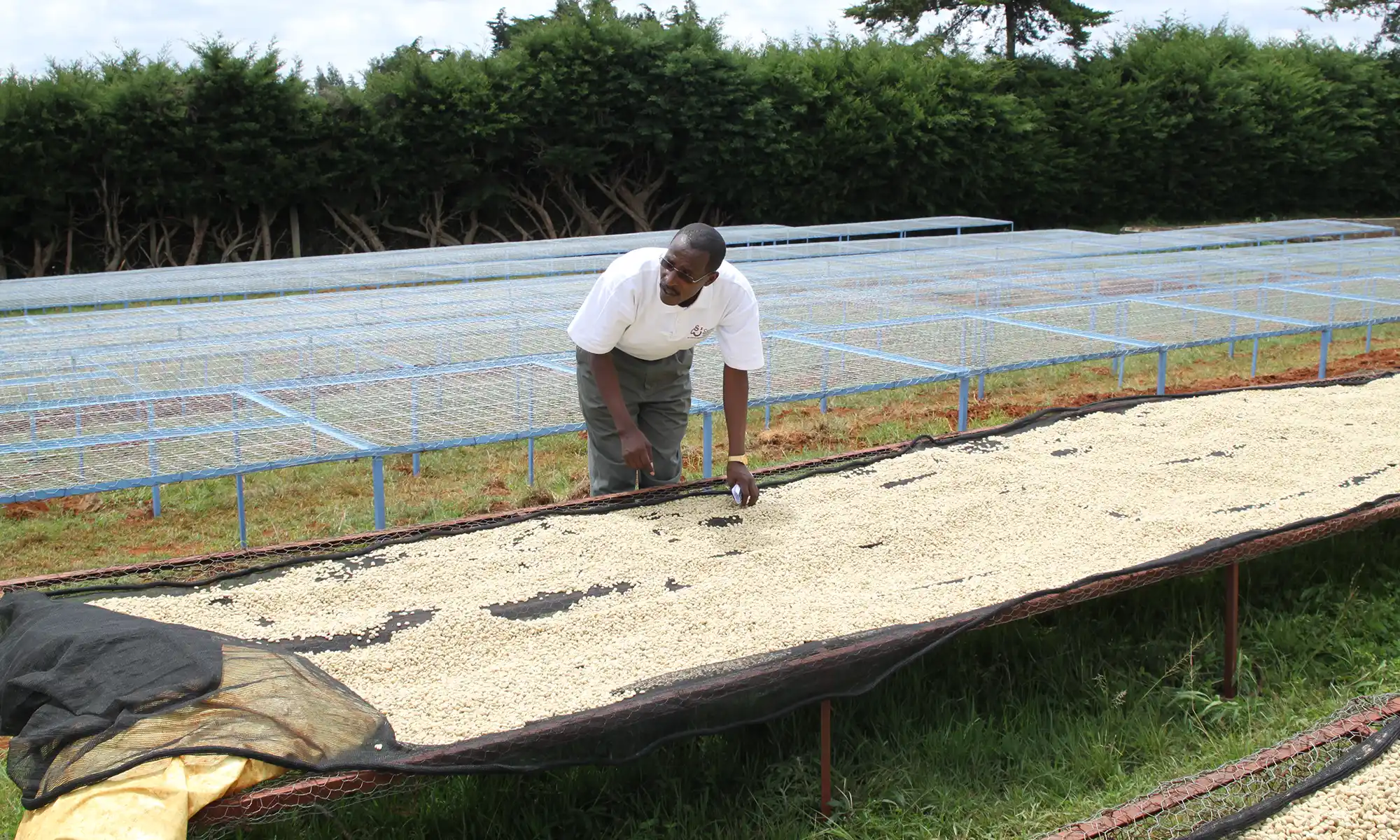
Picking & Sorting
The coffee cherries are typically hand picked by the farmers and their family members. After delivering the coffee cherries to the wet mill the good coffee cherries are separated from the inferior ones by hand sorting and they are delivered in separate cherry hoppers.
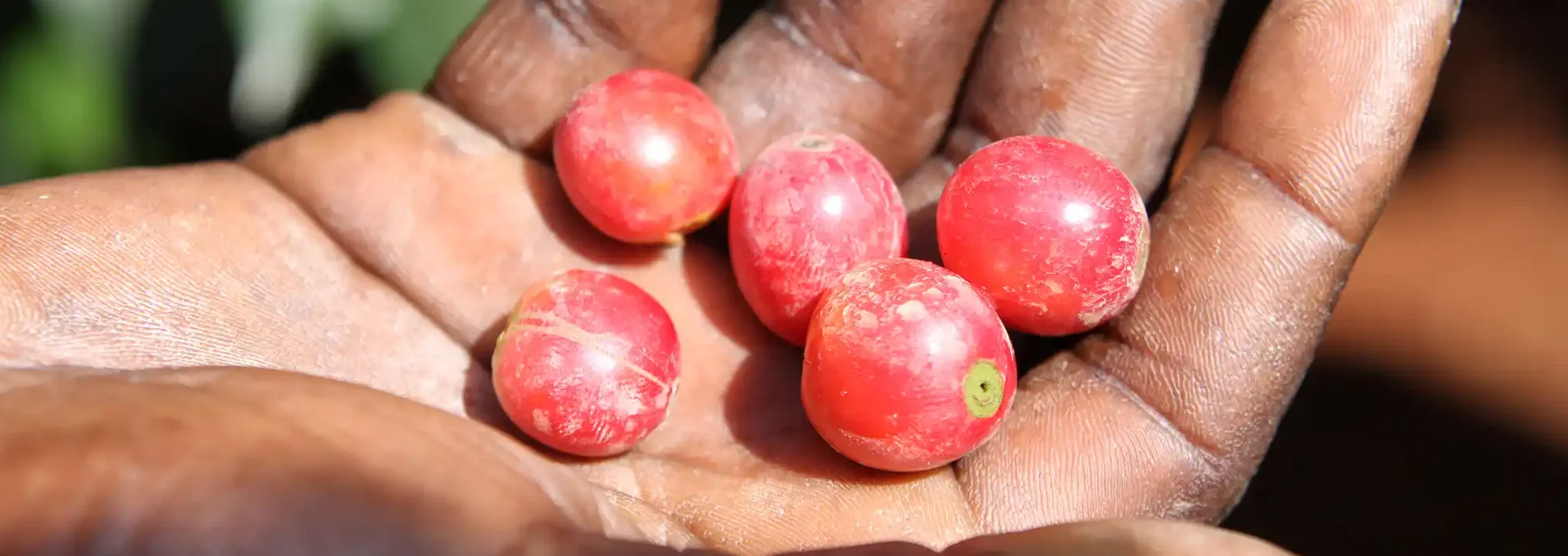

Depulping, Fermenting & Washing
The cherries are depulped and graded by using an old Aagard disc de-pulper that uses water and gravity to sort dense beans from less dense beans. Coffee of different grades are moved to separate fermentation tanks where the parchment coffee, with its mucilage still on, is dry fermented for about 12-16 hours overnight. After fermentation the coffee is washed in clean water and graded once again by gravity. The more dense beans are dried separately from the beans with lower density and inferior quality.
Drying
The coffees are dried on elevated drying tables, where defect parchment coffee gets sorted out by hand. Drying the coffee takes about 10 – 14 days. During daytime the coffees are raked to ensure even drying. The drying tables are covered during the hottest times of the day to avoid overheating and also at night time to prevent condensation. The drying process is finished when the moisture content in the coffee beans is between 10-12%. After drying, the coffees are stored in conditioning bins before delivery to the dry mill. The coffees we buy from Kenya are always vacuum packed before it is shipped to Norway.

